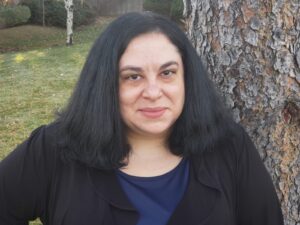
A Love and Truth Letter to the Multiplicitous Among Us (or “What They Don’t Tell You”)
To My Beloveds,
What they don’t tell you about being neither-this-nor-that is that it’s problematic. You are always living in the in-betweenness of things. That means you’re suspect, you’re shifty, you can’t be trusted. People want you to pick one thing, to be one thing, like in a game of five-card draw and you can just trade up. It’s actually like Texas hold ‘em—there are no choices. You can only work with the cards you are dealt.
What they don’t tell you is that this is all most people can handle when it comes to race, for example. Otherwise, you get questions like, “So, what are you?” I usually take a deep breath before responding, “I’m biracial. My dad was Puerto Rican, and my mom was Italian.” If their face registers further perplexion, I add, “My spouse is Moroccan [and Muslim, depending on the crowd]. That’s the ‘Hajbi’ part of my name.” Finally, a look of relief creeps over their face—that look like, “Oh, now I see. Now I get you.”
What they don’t tell you is that this state of forever in-betweenness doesn’t quite fit into the essentialisms about how one should properly embody identity. Early on in my ministerial formation, I had white church members tell me things like, “I don’t see you as a person of color” and “You speak very well [for your racial background].” They, of course, offered these sentiments as compliments. I believe these presentations and affects that church members experienced in me are likely the ones that make white students increasingly receptive to some of the more challenging content that I teach in my courses. Yet, some of these students might remain suspicious of whether I am too “biased” to be teaching about certain topics focused on systemic injustice and colonialism.
Conversely, my Latinidad creates a shared identity with students of color—Black, Indigenous, Asian, Latinx, and international students—because we harbor and endure similar subaltern experiences in/of the world. This is not to equate our experiences, however, as my light skin affords me great privileges in many respects. Moreover, among some Latinx students, not being a fluent Spanish speaker has relegated me to the edges. Similar looks of perplexion arise when people ask, “¿Hablas español?” and I respond, “No…poquito.” There are generational histories of trauma and assimilation behind this response, but I can’t explain that in the moment. The silence following our brief exchanges speaks volumes.
What they don’t tell you is that all of higher education, including theological education, is meant to be a practice of training people to be one thing, not many things. Previous generations of multiracial and multiethnic students and scholars alike were sometimes forced by these systems to either assimilate completely (if they had the privilege of “passing” as white or white-adjacent in some way) or to play into the role of the “other” within their institutions, relinquishing any whiteness altogether in favor of a different kind of power that came with being a representation of diversity for the whole. Neither option was/is ideal, simple, or always binary. These folks have had to “keep their hand” close to their chests.
What they don’t tell you is that this extends to other areas of identity and to academic disciplines themselves. One can be a biblical scholar, or a theologian, or a homiletician, or an ethicist, or a historian, and so on. To be more than one of these is to not be considered a true “expert.” But such disciplines, just like racial and other categories of identity, are modern constructions that constrain the realities of multiplicitous being and belonging. Being “interdisciplinary” is certainly cool these days, except when it’s not and can become a barrier to gaining respect and access to opportunities within the academy.
Ultimately, what they don’t tell you is that you are actually both-this-and-that. That you possess a superpower to hold within yourself more than one thing—more than one identity, more than one set of perspectives, more than one disciplinary area of knowledge/skill, more than one culture and all that such entails. That this in-betweenness attracts others who also exist within the liminal realms of being and makes it acceptable within the system to live more fully into their both-this-and-thatness. That this superpower held by many breaks open the systems themselves toward imagining new ways of being and doing.
In reality, what they don’t tell you about being both-this-and-that is that those who uphold such notions are just like you, even if they don’t feel it quite like you do. Perhaps your existence gives permission for these individuals to dismantle the silos, the only-one-thingness within themselves.
Peace and Love/Paz y Amor,
A Multiracial, Multiethnic, Interdisciplinary (and So Many Other Things) Teacher-Scholar
I appreciate this essay, Dr. Lizardy-Hajbi. You speak to my experience as well, and I’m grateful.